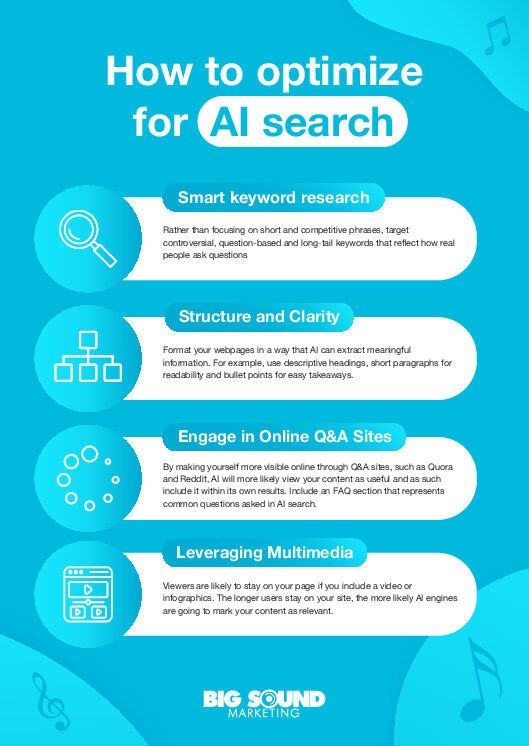How to Optimise for AI Search
As artificial intelligence reshapes the way people discover and interact with content online, it is becoming increasingly important to optimise your business for AI search engines. With the emergence of AI driven platforms such as ChatGPT, Bing Copilot and other intelligent assistants, businesses must now consider how their content is being selected, interpreted and surfaced by these systems.
Within this blog, we’ll be exploring how to optimise your business’ website for AI search, helping you stay relevant and competitive within today’s online world.

Smart Keyword Research
Just as with traditional SEO, AI search relies heavily on understanding intent. To help aid with this, effective keyword research can help your website be targeted by these AI engines. Rather than focusing on short and competitive phrases, it could be in your best interest to target conversational, question-based and long-tail keywords that reflect how real users ask questions and seek solutions.
For example, the phrase “What are the best eco-friendly skincare brands in the UK?’ may help a business who is looking to be included with AI search queries. This is because such a question is posed and phrased in a way that reflects how a person who is searching for this might type.
By identifying common queries within your niche, you can structure your content to answer real questions clearly and directly, increasing the chance it will be picked up by AI engines. Forums such as Reddit and Quora can also be great places to find common questions to be included within your content.
Structure and Clarity
AI models are designed to digest large volumes of content quickly, but they rely on structure and clarity to understand the relevance of your content. To optimise for AI search, you should format your webpages in a way that helps these systems extract meaningful information.
This can include:
- Descriptive headings and subheadings (H1, H2, H3) to clearly outline specific topics
- Short paragraphs for readability
- Bullet points and numbered lists for key takeaways
- Tables to present comparisons or data in a scan-friendly format
Well-structured content increased the likelihood that your site will be featured in AI-generated answers, summaries or featured snippets.
Crawlability and Fast Loading
AI search engines still rely on crawling technology to index your website, so it’s vital your site is technically sound.
To boost crawlability, focus on using clean and semantic HTML to structure your content properly. Create a clear linking structure for your site and submit an updated sitemap to search engines.
Consider the media that is included within your website and how it may impact loading speeds. This is another aspect of your website that an AI search engine will take into account, as it is highly likely to recommend webpages that prioritise user experience and quick access to information. Make sure to optimise images, compress file formats and enable caching withing your website.
Leveraging Multimedia
Time on page is a powerful engagement signal. The longer users stay on your site, the more likely AI search engines are to view your content as relevant, trustworthy and helpful.
Incorporating multimedia content can significant enhance this, as viewers are likely to stay on your page and interact with such media. These can be assets such as explainer videos, infographics or interactive elements such as quizzes. All of these are media which increase interest and therefore time spent on your website.
Not only do these assets enrich the user experience, they also increase the likelihood that your page will be referenced or linked within AI-generated responses, helping to boost the visibility of your business.
Final Thoughts
Optimisation for AI is becoming increasingly significant in today’s online world. By focusing on structured content, performing smart keyword research, ensuring technical performance and enriching your site with multimedia, you can help position your website to be included within AI-generated responses. The goal is no longer just to rank high, but to be referenced, quoted and surfaced by intelligent systems.
Need help preparing your site for AI search?
At Big Sound Marketing, we specialise in both traditional SEO and AI optimisation strategies tailored for AI discovery. Get in touch to find out how we can future-proof your digital presence.
Summary: Key Steps to Optimise for AI Search
Optimising your website for AI search engines involves a combination of strategic content creation and solid technical foundations. Here’s a quick recap of the key areas to focus on:
Perform in-depth keyword research to target conversational, intent-driven queries that AI tools are more likely to surface.
Structure your content clearly using descriptive headings, bullet points, and well-formatted layouts that are easy for both users and AI models to understand.
Ensure your website is crawlable and fast loading, with clean code, logical linking, and optimised performance across all devices.
Incorporate engaging multimedia content to keep visitors on your page longer, signalling relevance and quality to AI search engines.


